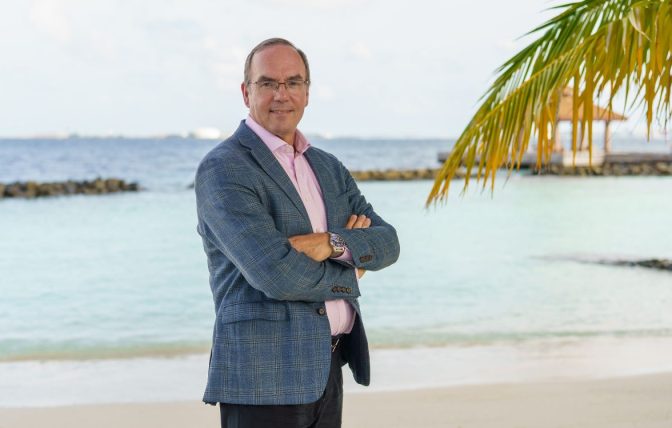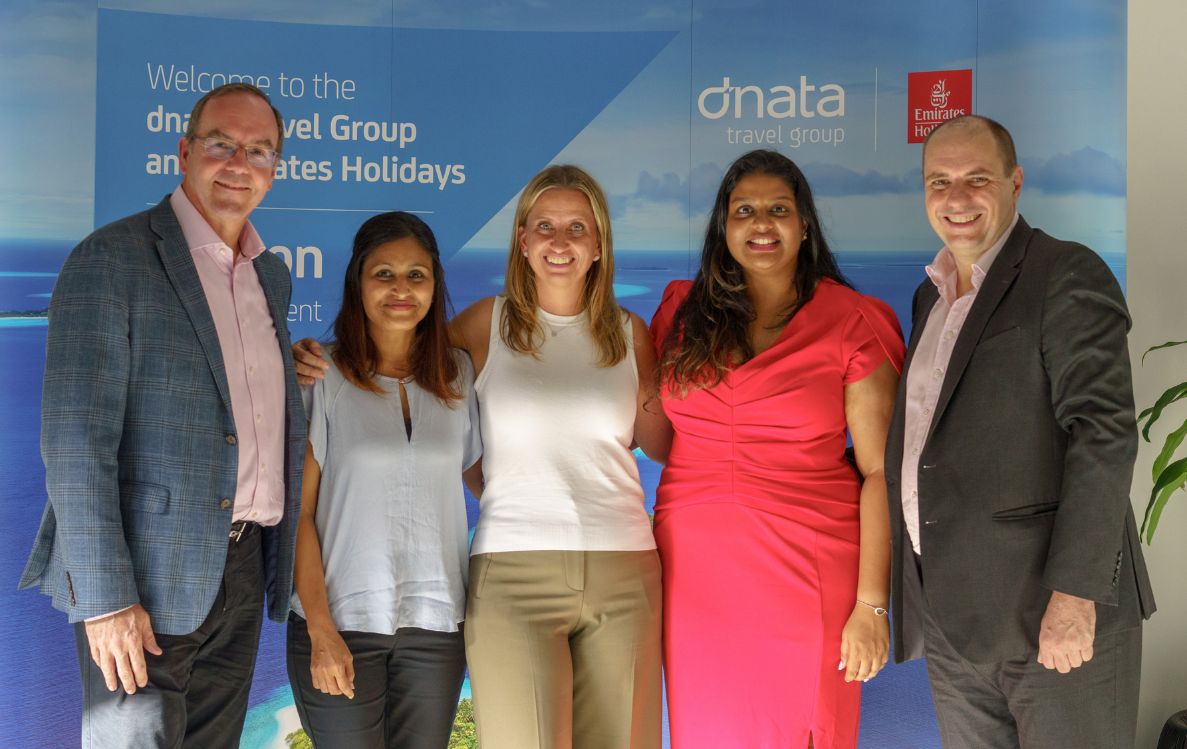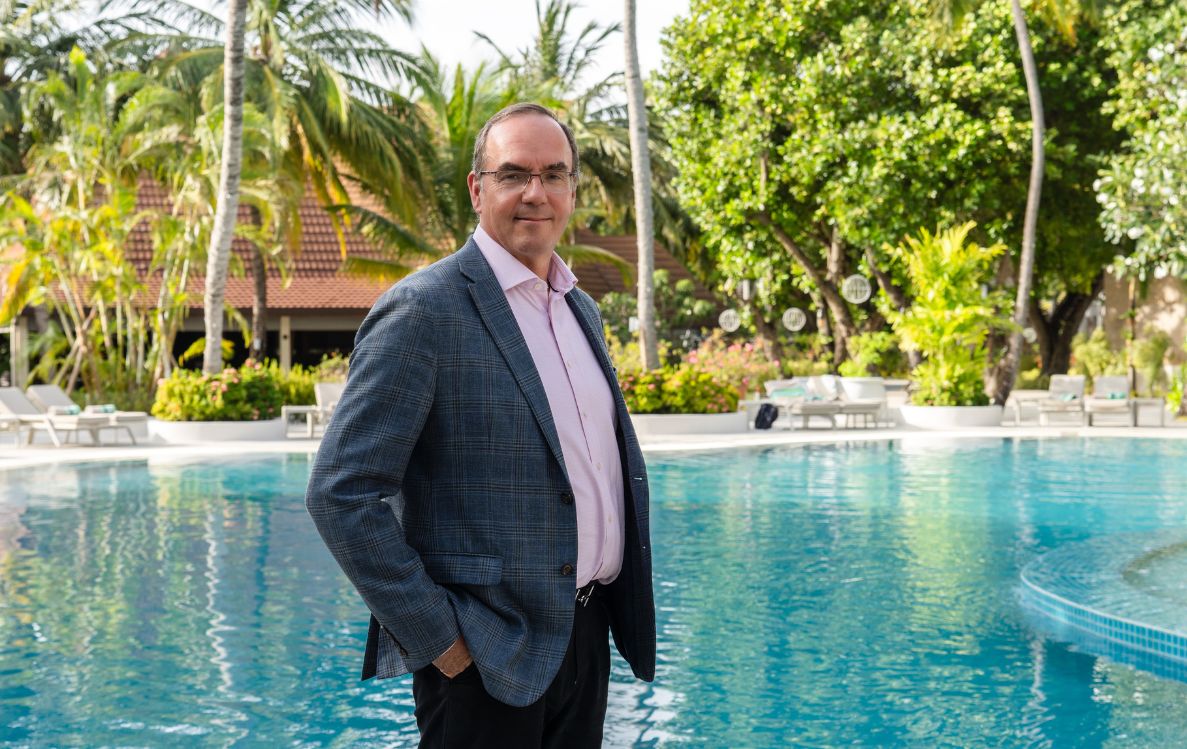John Bevan
CEO of dnata Travel Group
CEO of dnata Travel Group

John Bevan brings over three decades of experience and a deep-rooted passion for travel to his role as CEO of dnata Travel Group. Throughout his extensive career, John has worked across a broad spectrum of the travel industry in different areas. This diverse background gives him a unique and well-rounded perspective on how the travel landscape has evolved and continues to transform in today’s fast-paced, technology-driven world.
Under John’s leadership, dnata Travel Group is focused on driving innovation through technology and personalisation while expanding its footprint across global markets. In this exclusive interview at Horizon: Maldives event, John shares valuable insights into emerging industry trends, the Group’s strategic approach to growth, and his vision for the future of travel, a future where adaptability, collaboration, and customer-centric experiences will define success.
I began my career in the travel industry in 1987, starting in the hotel sector before moving into tour operations, which gave me a solid grounding in both customer service and business operations. In the early 2000s, I transitioned into online travel, running lastminute.com, one of the pioneers in OTAs in the UK from 2004 to 2008. I then helped with the UK launch of the Voyage Privé, UK branch, helping establish and grow the brand. After a brief stint in the wellness sector in Miami, I returned to travel in 2017 as CEO of Dnata Travel Group’s B2B division in the UK, later taking on our B2C brands.
Leading up to COVID, I was running our UK businesses, which included Gold Medal, Travelbag, Netflights, and Travel Republic. In June 2021, I relocated to Dubai to become the CEO of Dnata Travel Group globally, overseeing a diverse portfolio including DMCs, corporate travel in the UAE, our bedbank Yalago, and more. It’s been a fulfilling journey, and I remain excited by the continued evolution of the travel industry.
dnata Travel Group’s success in the Maldives, especially in the UK, comes from a long-standing focus, strong local partnerships, and a deep commitment to the destination. A key turning point was the launch of our Horizon event in 2022 by Seb and his team, which brought together local hoteliers, ministers, and our UK leadership. It strengthened relationships and created space for open, productive networking. Since then, we have expanded our brand presence, adding fast-growing brands like Travel Republic and partnering with our DMC in the region, right now Arabian Adventures, to promote the Maldives as a twin-centre destination with Dubai.
We have also invested heavily in FAM trips, helping build one of the UK’s most knowledgeable sales teams for the Maldives. We believe we have more salespeople in the UK who have personally experienced the destination than any other operator. This first-hand knowledge directly enhances the quality of service we provide to our customers, as our team can offer genuine insights and informed recommendations. We are also currently the only UK-based tour operator or group of operators with a dedicated purchasing and contracting team based locally or nearby in the Maldives. Our team of seven focuses exclusively on managing commercial agreements with Maldivian suppliers for the group. With one-person destinations from locations like Malé, Colombo, or Dubai.
This local insight, combined with our responsiveness and clear communication, helps us create win-win partnerships. Even during COVID, we stayed engaged through regular calls and virtual events like Horizon Online. But nothing replaces face-to-face connection, being here, meeting partners in person, and having a trusted Maldivian team member have been invaluable to strengthening relationships and driving the growth we have seen in recent years.

The Maldives remains, without question, a premier luxury destination within dnata’s global portfolio, a place that continues to capture the imagination of travellers worldwide. Renowned for its stunning white beaches and serene islands, it offers a unique escape, a true detox from the every day, where guests can unplug and recharge. What’s remarkable is how the destination has evolved beyond being just a honeymoon hotspot. Today, it caters to a diverse luxury market, including honeymooners, small groups, families, and multi-generational travellers.
This broad appeal has been particularly successful in the GCC market, where large family groups often book multiple villas complete with dedicated staff. A memorable example comes from a hotel sharing the story of a Saudi family that arrived with 800 kilos of luggage transported separately by boat, demonstrating the level of bespoke service and scale that the Maldives can accommodate. For dnata, the Maldives must remain a dream destination, not just for couples but for entire families across generations. With its wide range of luxury offerings, the Maldives is no longer just about idyllic sand beaches and simple beachfront villas; it now presents an enriched and diverse luxury experience with something to offer every type of traveller.
Our top markets remain the usual, most notably the UK, which is our strongest. Thanks to the efforts of our bed bank Yalago, and our DMC, which are actively promoting the destination, we have been able to open newer markets like the USA, which require more support. While China has traditionally been strong, our presence there is limited, though we do have representation through partners at Arabian Adventures. We’re also expanding into other Asian markets, such as South Korea. What sets us apart is our ability to establish on-the-ground operations that enable collaboration with other businesses, covering core markets while exploring exciting growth opportunities in North and South America.
The Middle East is seeing rapid growth, particularly in the UAE and Saudi Arabia, where we’re increasingly expanding into B2C through our dnata Travel business. Both markets are maturing quickly, driven by a notably young demographic, with average ages under 30 compared to 38–48 in Europe. These younger audiences often travel in multi-generational groups, creating unique opportunities for us. It’s a market we have already begun to tap into and plan to accelerate further. Additionally, our recent rebranding work at dnata Travel will support this momentum, complementing the significant efforts by regional governments, especially in Saudi Arabia, to open up tourism and encourage both inbound and outbound travel.
dnata Travel Group has a long-standing and successful relationship with Maldivian hoteliers and resorts, who have consistently supported us with strategic offers, particularly during the low season. This collaboration has been key to our ability to drive bookings year-round, with 41% of our business to the Maldives now taking place outside peak periods. The UK market, in particular, travels throughout summer, even during wetter months, viewing the Maldives as a year-round destination. These results are only possible thanks to our strong partnerships with major hotel groups.
More recently, we have taken this collaboration a step further through pilot campaigns with the Maldives Marketing & PR Corporation (MMPRC). For the first time, the tourism board has co-funded promotional activity, and we have already launched campaigns through our Travelbag brand in the UK and dnata Travel in the UAE, with plans to extend to Emirates Holidays. These test-and-learn initiatives allow us to track return on investment and refine strategies across channels and markets. With each dnata brand tailoring its campaigns based on audience behaviour and booking patterns, we’re confident this approach will strengthen Maldives tourism and deliver long-term impact.

Luxury travel is evolving, and sustainability is now a driving force behind travellers’ decisions. A few years ago, only a small percentage factored it into their bookings. Today, that number is closer to 70%. While willingness to pay more for eco-conscious options is still emerging, expectations are rising. The Maldives is making notable strides in renewable energy and waste management, with new resorts required to meet strict sustainability criteria. Yet, to maintain its leadership, the destination must work toward standardising environmental practices across all properties. Revisiting hotel classification standards may also be necessary to clearly differentiate levels of service and quality within the five-star segment.
At the same time, hyper-personalisation is reshaping what luxury means. High-end travellers now expect curated, meaningful experiences, from dietary requirements to family-focused itineraries. Many Maldivian resorts are already excelling in this area, but global competitors, particularly in Dubai, are continuously raising the bar. Enhanced digital systems and CRM tools are set to play a major role in the next phase of this evolution, enabling resorts to tailor stays before guests even arrive. Add in shorter booking windows and rising demand for flexible, spontaneous travel and the Maldives is in a strong position to adapt and thrive.
The travel industry today is a dynamic mix of anticipation and challenge. What excites me is our diverse, interconnected brands that let us shift focus between markets, ensuring opportunities are always just around the corner. Travel itself is evolving rapidly, driven by ever-improving technology and a world that feels smaller and more accessible every day. At the same time, generative AI is shaking things up for travel operators like us. Customers can create their own itineraries, but often, the data isn’t accurate or personalised enough. While people want quick answers, especially luxury travellers, when it comes to complex trips or new destinations, they still rely on expert agents for that tailored touch.
What truly fascinates me is how technology, especially AI, can help us become even better at what we do. By using our own content and customer data, we’ll be able to offer hyper-personalised trips quickly, paired with skilled agents who truly understand each traveller’s preferences. This will raise the bar for travel operators, pushing us to add more value and professionalism. Even though many people book online, a significant portion still prefers offline channels, especially in places like the GCC, where personal interaction and cash payments remain common. That mix of technology and expertise is what makes the future of travel not just promising, but truly transformative to me.